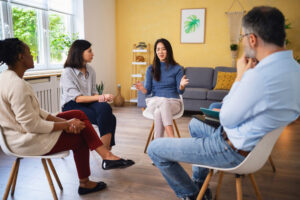My colleagues and I have noticed a dramatic increase in anxiety and anxiety-related disorders over the past two pandemic years. While apprehension is a typical response during times of strife, as we return to more normal lives, many people have been caught off-guard to realize how uncomfortable they now are in social situations – especially if they were never fearful before.
And for those who were challenged with social anxiety prior to Covid, being distanced from others for two years was a blessing in disguise. They were able to stay in their comfort zones, skip distressing situations entirely, and avoid in-person interactions. Now that everything is changing, they worry about venturing out once again.
But, if we consider that we’ve been fairly sequestered from each other for such a long time, it makes sense that social anxiety is now present in so many people. Although strict social distancing measures were necessary, they helped us feel protected and stay safe, which makes it all the harder to let go and start interacting socially now.
In addition, many people experienced a great deal of trauma, uncertainty and fear during the pandemic. They learned to associate social situations with infection. As a result, they now feel vulnerable around others, and those helpless feelings will be hard to shake as the pandemic moves into the endemic stage.
Is It Normal That I Feel Anxious After The Pandemic?
Some emotional aspects of social anxiety involve perceived feelings of judgment and disapproval by others. Physical signs include sweating, a racing heart, difficulty concentrating, and feeling nauseous. For many, simply thinking about going out socially could bring on any of these symptoms or a combination of them.
Superficial differences also contribute to social anxiety, especially now. Some people have already dropped Covid protocols, but others will continue to hold tightly to safety measures, like mask-wearing and standing away from people. Consequently, those who don’t do the same may feel judged for their own relaxed standards.
For example, if they go to a social event unmasked, they may spend the entire time feeling extremely anxious around those who are wearing one. They might become nauseous or break out in a cold sweat when interacting with a masked person – even if they are surrounded by family or friends.
They may also have problems concentrating or focusing on conversations. Feeling confident in themselves could seem next to impossible when they are convinced that everyone is staring at them.
If this happens often enough or their reaction is strong enough, their anxiety might cause them to avoid social situations entirely. While doing so brings short-term relief, continuing to evade people over time can lead to isolation and a feeling of being disconnected from others.
How To Deal With Social Anxiety After Covid
Some of us will fill our social calendars in the coming months while others will struggle emotionally with the current relaxed social standards.
If you are feeling anxious about resuming a social life, don’t accept every invitation, at first. Remember that this is a time of transition for everyone. Be choosy about which social gatherings you attend, limit yourself to the ones that enforce similar personal protocols, and give yourself a breather in between them.
The same goes for your return to the office. If you are able to be flexible, take baby steps when going back into the workplace. Perhaps you can go into the office one day a week for the first week or two, and then slowly increase your number of days from there.
If you can’t ease your way back into the workplace, reach out to others for support. Most likely many people you know will have already been in the office for a few weeks. Ask them how they handled their nerves when they went back. What did they do to cope? No doubt, they found each successive work day a little easier to manage as they got used to their old routine.
Be kind to yourself during this transition, as well. Keep in mind that, as is frequently the case with social anxiety, the anticipation is often worse than the actual event.
Try to eat a good diet, relax and do something you enjoy, and get a good night’s sleep the day (or weekend) before you go back into the office. Above all, avoid anything that might stress you and negatively affect your first days back.
Additionally, it is crucial to stay positive and optimistic, even when social interactions are difficult or uncomfortable. With time and patience, it is possible to manage social anxiety during this difficult period and eventually regain your normal routine.
If social anxiety is still causing significant distress or impairment in your life even after trying these strategies, don’t hesitate to seek professional help. A therapist or counselor can help you explore other options and develop a treatment plan that works for you.
Did You Know? We’re a Regional Clinic for the National Social Anxiety Center
The Center for Treatment of Anxiety and Mood Disorders in Delray Beach, Florida is a regional center for the National Social Anxiety Center. Our certified therapists provide compassionate care and have specialized training in social anxiety treatment and virtual reality therapy. For more information, contact us or call us today at 561-496-1094.
Dr. Andrew Rosen
Dr. Andrew Rosen PHD, ABPP, FAACP is a Board-Certified Psychologist and the Founder and Director of The Center for Treatment of Anxiety and Mood Disorders, as well as, the Founder of The Children’s Center for Psychiatry Psychology and Related Services.





